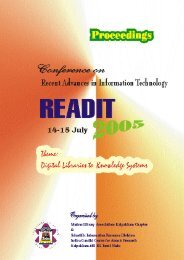READIT-2007 - Indira Gandhi Centre for Atomic Research
READIT-2007 - Indira Gandhi Centre for Atomic Research
READIT-2007 - Indira Gandhi Centre for Atomic Research
Create successful ePaper yourself
Turn your PDF publications into a flip-book with our unique Google optimized e-Paper software.
Nuclear Knowledge Management (NKM) at IGCAR:<br />
A case study on Fast Reactors<br />
A.Narayanan*, J.Srinivasan*, V.Rajendran* and M.Somasekharan *<br />
Abstract<br />
Knowledge is increasingly being recognized as a primary source of wealth that makes a difference<br />
between success and failure. Managing knowledge can be seen as the process governing creation, the<br />
dissemination and utilization of knowledge. Any organization carrying out research & development<br />
activities in nuclear engineering, especially in diversified areas of Fast Reactor technology to solve topical<br />
problems based on experiences, model-oriented experiments and fundamental research, needs a<br />
continuously updated body of knowledge.<br />
The loss of organizational memory of nuclear knowledge in governments, organizations,<br />
academia and research institutes could become the precursor in dealing with the problems in nuclear<br />
safety, security and non-proliferation. Thus knowledge management of fast reactor technology has emerged<br />
as a growing challenge in recent years.<br />
This paper covers the general aspects of Knowledge Management including fundamental concepts<br />
and overview model <strong>for</strong> KM depicting explicit and tacit knowledge transfer on fast reactors. It also briefs<br />
the IAEA’s initiatives on KM activities practiced in their member countries on fast reactors. The authors<br />
are dwelling upon the procedures and methods <strong>for</strong> creating module <strong>for</strong> knowledge preservation and<br />
maintenance to be followed in IGCAR – taking FBTR as a case study.<br />
An effective KM tool is needed to assist, understand, benchmark the current practices followed<br />
against their past per<strong>for</strong>mances. Examples of KM per<strong>for</strong>mance indicators include savings due to the reuse<br />
of knowledge; availability of expertise networks; time to create new knowledge, accessibility and<br />
availability of various KM & in<strong>for</strong>mation sharing tools to peers and contributors as well.<br />
1. INTRODUCTION<br />
The fast reactor technology, the mission oriented endeavour of this centre, relies<br />
heavily on a vast amount of accumulation of knowledge, in inter-disciplinary scientific<br />
research, engineering analysis, design documentation, operational data, maintenance<br />
records, regulatory reviews and countless other pieces of technical in<strong>for</strong>mation. This<br />
organizational knowledge combined with an immense and complex reservoir of people<br />
such as scientists, engineers and technicians of many disciplines having the requisite<br />
educational and technical background, expertise and acquired insight to apply that<br />
body of knowledge safely and effectively to further the cause of energy security and<br />
environmental perspective of India.<br />
The effective knowledge management process of fast reactor includes ensuring<br />
the continued availability of the above essential reservoir of knowledge, experience<br />
available in explicit, implicit and tacit <strong>for</strong>m from the qualified personnel that need to be<br />
developed and preserved. The critical issues of knowledge management on fast reactors<br />
are to ensure safety, security, and encouraging new innovation and also to ascertain<br />
harnessing benefits of nuclear energy remains available <strong>for</strong> future generation.<br />
* Scientific In<strong>for</strong>mation Resource Division, <strong>Indira</strong> <strong>Gandhi</strong> <strong>Centre</strong> <strong>for</strong> <strong>Atomic</strong> <strong>Research</strong>, Kalpakkam,<br />
Email: an@igcar.gov.in<br />
180

















